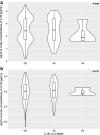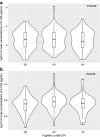Genetic variation in the immune system and malaria susceptibility in infants: a nested case-control study in Nanoro, Burkina Faso
- PMID: 33593344
- PMCID: PMC7885350
- DOI: 10.1186/s12936-021-03628-y
Genetic variation in the immune system and malaria susceptibility in infants: a nested case-control study in Nanoro, Burkina Faso
Abstract
Background: Genetic polymorphisms in the human immune system modulate susceptibility to malaria. However, there is a paucity of data on the contribution of immunogenetic variants to malaria susceptibility in infants, who present differential biological features related to the immaturity of their adaptive immune system, the protective effect of maternal antibodies and fetal haemoglobin. This study investigated the association between genetic variation in innate immune response genes and malaria susceptibility during the first year of life in 656 infants from a birth cohort survey performed in Nanoro, Burkina Faso.
Methods: Seventeen single nucleotide polymorphisms (SNPs) in 11 genes of the immune system previously associated with different malaria phenotypes were genotyped using TaqMan allelic hybridization assays in a Fluidigm platform. Plasmodium falciparum infection and clinical disease were documented by active and passive case detection. Case-control association analyses for both alleles and genotypes were carried out using univariate and multivariate logistic regression. For cytokines showing significant SNP associations in multivariate analyses, cord blood supernatant concentrations were measured by quantitative suspension array technology (Luminex).
Results: Genetic variants in IL-1β (rs1143634) and FcγRIIA/CD32 (rs1801274)-both in allelic, dominant and co-dominant models-were significantly associated with protection from both P. falciparum infection and clinical malaria. Furthermore, heterozygote individuals with rs1801274 SNP in FcγRIIA/CD32 showed higher IL-1RA levels compared to wild-type homozygotes (P = 0.024), a cytokine whose production is promoted by the binding of IgG immune complexes to Fcγ receptors on effector immune cells.
Conclusions: These findings indicate that genetic polymorphisms in genes driving innate immune responses are associated to malaria susceptibility during the first year of life, possibly by modulating production of inflammatory mediators.
Keywords: Cytokines; Immunogenetic variants; Innate immunity; Malaria; Plasmodium falciparum.
Conflict of interest statement
The authors declare that they have no competing interests.
Figures


References
-
- WHO . World malaria report 2016. Geneva: World Health Organization; 2016.
-
- WHO . World malaria report 2017. Geneva: World Health Organization; 2017.
-
- Hill AV. Genetics of infectious disease resistance. Curr Opin Genet Dev. 1996;6:348–353. - PubMed
MeSH terms
Grants and funding
LinkOut - more resources
Full Text Sources
Other Literature Sources
Miscellaneous

